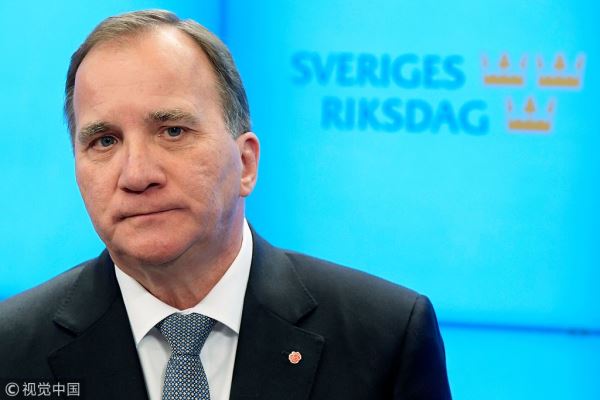 |
Extreme right makes it difficult for Sweden to be that "ideal country"点击次数:2408
发布时间:2018-09-28 12:15:35
|
|---|
Note: The following is an edited translation of a commentary from the Chinese-language "Commentaries on International Affairs."
![Swedish Prime Minister Stefan Lofven speaks to the press after he was ousted in a vote of no-confidence in the Swedish Parliament Riksdagen on September 25, 2018 in Stockholm.[Photo:VCG]](/Upload/20180928121958RgHD.jpg?x-oss-process=image/resize,w_650)
Swedish Prime Minister Stefan Lofven speaks to the press after he was ousted in a vote of no-confidence in the Swedish Parliament Riksdagen on September 25, 2018 in Stockholm. [Photo:VCG]
Sweden's Prime Minister Stefan Lofven was ousted from his post on Tuesday after losing a vote of confidence in the parliament. This follows the failure of the country's center-left and center-right camps to win a majority in the parliamentary elections earlier this month, with the result that the far-right has grown rapidly in strength and is likely to influence the formation of the next cabinet. Chances of shift to the right in Sweden's political circles has further increased.
Sweden has long been regarded as a so-called "ideal country" due to its high level of social welfare, security, inclusiveness, and openness. But in recent years, negative news about Sweden has frequently appeared in the international media. Shootings, riots, gang clashes, and racial discrimination are becoming more frequent. "I often use Sweden as a deterring example," said former NATO Secretary General and Danish Prime Minister Anders Fogh Rasmussen when talking about Sweden's immigration policy. These developments are directly affecting the direction of the Swedish politics.
Accompanying the growing trend towards the extremist right is the deterioration of public security in Sweden. On April 7 last year, a hijacked truck plowed through a crowd of people in central Stockholm, killing four and injuring 15. After the incident, the Swedish government adopted new security measures, but the security situation has not improved significantly. On the evening of August 13 this year, more than 100 cars in Sweden's second-largest city Gothenburg were damaged or burned in a mass arson attack by local youths wearing black pullovers. And gang-related shootings have also become a frequent occurrence. According to data released by Swedish police, 320 shootings occurred in Sweden in 2017 alone. In order to closely monitor gang and drug crime activity, Sweden established 23 "vulnerable areas" that are considered high-crime areas. These have become what are often described as "no-go zones".
Blaming the deterioration of law and order in Sweden in recent years on refugees fails to analyze the problem in its entirety. According to data from the Swedish National Council for Crime Prevention, the country's crime rate has increased significantly since the refugee crisis broke out in Europe. Since 2012, Sweden, with a population of only 10 million, has received about 400,000 refugees and is now host to the largest number of refugees in Northern Europe. But the Swedish government was not prepared for the influx of such a large number of refugees. The number of criminal cases involving refugees has soared, and the refugees themselves have often been targeted by locals.
To make matters worse, the Swedish economy was severely affected by the European debt crisis in 2009. Economic growth has slowed, and unemployment has risen. The pride in the country's high tax, high welfare governance model has been shaken. Social dissatisfaction is rising, which is fueling the spread of right-wing extremism. This has, in turn, intensified social conflicts, led to a growth in social divisions, and gradually pushed refugees to the edges of society. Taken together, these developments led to a fall in support for the long-ruling center-left camp. The shift rightwards has helped the center-right, but it has also lent more support to the far right as well.
The combination of all the above-mentioned factors has meant that Sweden, which was once a country where people didn't feel the need to lock their doors, is increasingly associated with violence, conflict, and riots. Once known as a place of inclusiveness, tolerance, equality, and pluralism, the country risks sliding deeper into xenophobia, discrimination, and prejudice.
Whether Sweden's new government can make a difference when it comes to issues of social welfare and the refugee crisis remains to be seen. What populist and far-right politicians and media figures should really do is abandon their growing prejudice and again embrace the spirit of inclusiveness, tolerance, equality, and pluralism for which the country was once lauded.